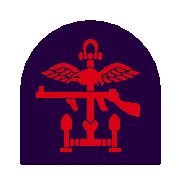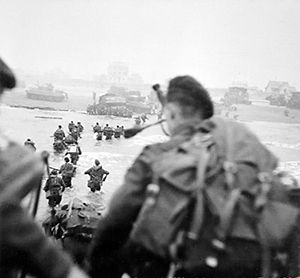
David Paton (doctor)
Encyclopedia
Lieutenant-Colonel David Paton (1912-2008) was medical officer and the last surviving member of the St Nazaire raid of World War II, sometimes called “The Greatest Raid of All.”
, Scotland, on the 30 July 1912 and was educated at the Hamilton Academy
, a prestigious Scottish school that featured in the Scottish Secondary Teachers’ Association 1950 magazine article series ‘Famous Scottish Schools.’ From Hamilton Academy Paton entered the University of Glasgow
reading Medicine; at university joining the Officer Training Corps.
, Glasgow, before being called-up to the Royal Army Medical Corps
in 1939. After serving at the War Office
and several army camps in southern England, he was appointed medical officer to the garrison at Catterick
, Yorkshire, England, and just prior to Christmas 1941 was transferred to the Orkney Isles and from there to Ayr
where he was seconded to the Commandos
.
As medical officer with the Royal Navy and Army Commando unit, under the command of Lord Louis Mountbatten, British Chief of Combined Operations, Paton was part of the daring raid on the dry dock at the occupied French port of St. Nazaire (Operation Chariot) on the 28 March 1942. This attack on the dry dock behind enemy lines was an attempt to neutralise the ability of the German battleship Tirpitz
to attack Atlantic supply lines to Britain as the dry dock at St. Nazaire was the only dock on the Atlantic coast of occupied France large enough to accommodate the Tirptiz and, as base, would allow the German battleship to attack British shipping supply lines. The 1952 film The Gift Horse starring Trevor Howard
was based on the true story of the raid on St. Nazaire.
 David Paton was to see action again when on D-Day, 6 June 1944, he landed at Sword Beach
David Paton was to see action again when on D-Day, 6 June 1944, he landed at Sword Beach
, Normandy, as second-in-command of 223 Field Ambulance with the Commandos of the 1st Special Service Brigade
, under the command of Brigadier Lord Lovat
. Retiring from the Army as a Lieutenant-Colonel, in later years he provided first-hand background information to the Channel 4
Retiring from the Army as a Lieutenant-Colonel, in later years he provided first-hand background information to the Channel 4
2002 television series on the history of the Commandos.
for the Thames Valley Police Force and was also president of the Windsor Medical Society and secretary of the Thames Valley division of the British Medical Association
, of which he was elected an Honorary Member.
Lieutenant-Colonel Dr. David Paton died aged 95 at Slough, Berkshire, England, on the 10 July 2008.
Early life and education
David Paton was born at Hamilton, South LanarkshireHamilton, South Lanarkshire
Hamilton is a town in South Lanarkshire, in the west-central Lowlands of Scotland. It serves as the main administrative centre of the South Lanarkshire council area. It is the fifth-biggest town in Scotland after Paisley, East Kilbride, Livingston and Cumbernauld...
, Scotland, on the 30 July 1912 and was educated at the Hamilton Academy
Hamilton Academy
Hamilton Academy was a school situated in Hamilton, South Lanarkshire, Scotland.Described as "one of the finest schools in Scotland" in the Cambridge University Press County Biography of 1910, Hamilton Academy featured in the Scottish Secondary Teachers' Association Magazine article series on...
, a prestigious Scottish school that featured in the Scottish Secondary Teachers’ Association 1950 magazine article series ‘Famous Scottish Schools.’ From Hamilton Academy Paton entered the University of Glasgow
University of Glasgow
The University of Glasgow is the fourth-oldest university in the English-speaking world and one of Scotland's four ancient universities. Located in Glasgow, the university was founded in 1451 and is presently one of seventeen British higher education institutions ranked amongst the top 100 of the...
reading Medicine; at university joining the Officer Training Corps.
The War Years
On graduation Paton worked at the Western InfirmaryWestern Infirmary
The Western Infirmary is a teaching hospital situated in the West End of Glasgow, Scotland. There is also a Maggie's centre at the hospital to help cancer patients, as well as the Glasgow Clinical Research Facility....
, Glasgow, before being called-up to the Royal Army Medical Corps
Royal Army Medical Corps
The Royal Army Medical Corps is a specialist corps in the British Army which provides medical services to all British Army personnel and their families in war and in peace...
in 1939. After serving at the War Office
War Office
The War Office was a department of the British Government, responsible for the administration of the British Army between the 17th century and 1964, when its functions were transferred to the Ministry of Defence...
and several army camps in southern England, he was appointed medical officer to the garrison at Catterick
Catterick Garrison
Catterick Garrison is a major Army base located in Northern England. It is the largest British Army garrison in the world with a population of around 12,000, plus a large temporary population of soldiers, and is larger than its older neighbour...
, Yorkshire, England, and just prior to Christmas 1941 was transferred to the Orkney Isles and from there to Ayr
Ayr
Ayr is a town and port situated on the Firth of Clyde in south-west Scotland. With a population of around 46,000, Ayr is the largest settlement in Ayrshire, of which it is the county town, and has held royal burgh status since 1205...
where he was seconded to the Commandos
British Commandos
The British Commandos were formed during the Second World War in June 1940, following a request from the British Prime Minister, Winston Churchill, for a force that could carry out raids against German-occupied Europe...
.
As medical officer with the Royal Navy and Army Commando unit, under the command of Lord Louis Mountbatten, British Chief of Combined Operations, Paton was part of the daring raid on the dry dock at the occupied French port of St. Nazaire (Operation Chariot) on the 28 March 1942. This attack on the dry dock behind enemy lines was an attempt to neutralise the ability of the German battleship Tirpitz
German battleship Tirpitz
Tirpitz was the second of two s built for the German Kriegsmarine during World War II. Named after Grand Admiral Alfred von Tirpitz, the architect of the Imperial Navy, the ship was laid down at the Kriegsmarinewerft in Wilhelmshaven in November 1936 and launched two and a half years later in April...
to attack Atlantic supply lines to Britain as the dry dock at St. Nazaire was the only dock on the Atlantic coast of occupied France large enough to accommodate the Tirptiz and, as base, would allow the German battleship to attack British shipping supply lines. The 1952 film The Gift Horse starring Trevor Howard
Trevor Howard
Trevor Howard , born Trevor Wallace Howard-Smith, was an English film, stage and television actor.-Early life:...
was based on the true story of the raid on St. Nazaire.

Sword Beach
Sword, commonly known as Sword Beach, was the code name given to one of the five main landing areas along the Normandy coast during the initial assault phase, Operation Neptune, of Operation Overlord; the Allied invasion of German-occupied France that commenced on 6 June 1944...
, Normandy, as second-in-command of 223 Field Ambulance with the Commandos of the 1st Special Service Brigade
1st Special Service Brigade
The 1st Special Service Brigade was a brigade of the British Army. Formed during World War II, it consisted of elements of the army and the Royal Marines. The brigade's component units saw action individually in Norway and the Dieppe Raid , before being combined under one commander for service in...
, under the command of Brigadier Lord Lovat
Simon Fraser, 15th Lord Lovat
Brigadier Simon Christopher Joseph Fraser, 15th Lord Lovat and 4th Baron Lovat DSO, MC, TD was the 25th Chief of the Clan Fraser and a prominent British Commando during the Second World War...
.

Channel 4
Channel 4 is a British public-service television broadcaster which began working on 2 November 1982. Although largely commercially self-funded, it is ultimately publicly owned; originally a subsidiary of the Independent Broadcasting Authority , the station is now owned and operated by the Channel...
2002 television series on the history of the Commandos.
Retirement
On his retirement from General Practice in Buckinghamshire, England, in 1972, Paton was appointed a police surgeonForensic pathology
Forensic pathology is a branch of pathology concerned with determining the cause of death by examination of a corpse. The autopsy is performed by the pathologist at the request of a coroner or medical examiner usually during the investigation of criminal law cases and civil law cases in some...
for the Thames Valley Police Force and was also president of the Windsor Medical Society and secretary of the Thames Valley division of the British Medical Association
British Medical Association
The British Medical Association is the professional association and registered trade union for doctors in the United Kingdom. The association does not regulate or certify doctors, a responsibility which lies with the General Medical Council. The association’s headquarters are located in BMA House,...
, of which he was elected an Honorary Member.
Lieutenant-Colonel Dr. David Paton died aged 95 at Slough, Berkshire, England, on the 10 July 2008.

